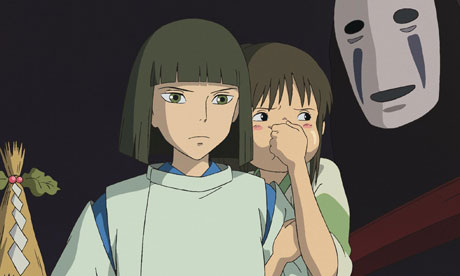
How come the big US animators don't see the need for heroines to lead their films, when Japan's Studio Ghibli has shown you don't need a male protagonist to make a film that's both commercially and artistically successful? That was the question posed last week by Steve Rose.
That Hollywood is aware of the issue was a point made by andyos: "I interviewed Pete Docter (director of Monsters Inc and Up) for a magazine article, and brought up the gender issue. Docter had no hesitation in agreeing it was an issue: 'We've tried at times to write more female characters, but it's very difficult. We're not as familiar with them, and you feel as though they're under intense scrutiny (from the audience). It's very easy for us to make male characters have foibles, but with females, it's sometimes more delicate. Hopefully that will change.'"
It's worth looking at the people who make the films for Disney/Pixar and the other big animators for an explanation, suggested greenwichlee: "People who make animations are mostly 30-50something men. So rather than making films about pubescent girls or boys, Pixar makes films that are emotionally honest, dealing with characters and situations which clearly draw upon the writer's own lives and feelings. Finding Nemo was inspired by the director's anxiety about letting his kid out of his sight, for example. I do like Ghibli's work, but Pixar at their best catch at something deeper and truer. They are allegories rather than – admittedly glorious – fantasies."
Lending even more support to the US cause was happytourist, one of several posters to the article thread to point out the number of strong female characters in Hollywood animation: "I love Studio Ghibli … but can't get on board with the Disney-bashing. Gender issues aside, the output of Disney in the 90s and Pixar in the last decade has been pretty superlative – and as for strong heroines, what about Mulan, Lilo, Belle, Esmerelda, Megara, Elastigirl, Tiana … Disney has plenty of great female characters who could hold their own with Chihiro, Mononoke, Kiki et al."
Elsewhere, Tom Ewing pondered the nature of the Great British Album in the wake of the Horrors' new release. He was pinpointing albums whose greatness is predicated not on quality so much as ubiquity – those epic, windswept ones that have provided breakthroughs for indie bands over the last couple of decades. MarcBurrows provided a useful practical example: "In the 90s I remember watching an episode of Grange Hill, where a character put on Everything Must Go at track one, and was shown five minutes later listening to the final track – the audience all understood that an hour had passed because pretty much everyone watching had the album and knew the tracklist. That's a 'Great British Rock Record'. Completely universal, solid and utterly everyman."
"The progression towards the 'arena sound' is pretty much defined for me by Simple Minds," said TokenGesture, "who I got into at a tender age with Alive and Kicking, only much later to discover their earlier, more experimental side. For it to work I think it requires a band to genuinely wish to communicate with a mass audience – the breadth of the sound follows that desire. I can't see the Horrors matching this on current form – they seem too insulated."
Jim Shelley's piece about The Inbetweeners movie provoked fierce arguments about whether the original TV show was a) truthful and hilarious or b) puerile rubbish. So we'll content ourselves with a gag from the show, posted by CousinBebop:
Simon: "No one brings a bag of shit to a pub."
Jay: "Your dad does."
Simon: "Does he?"
Jay: "Yeah, your mum."
Puerile? That?

